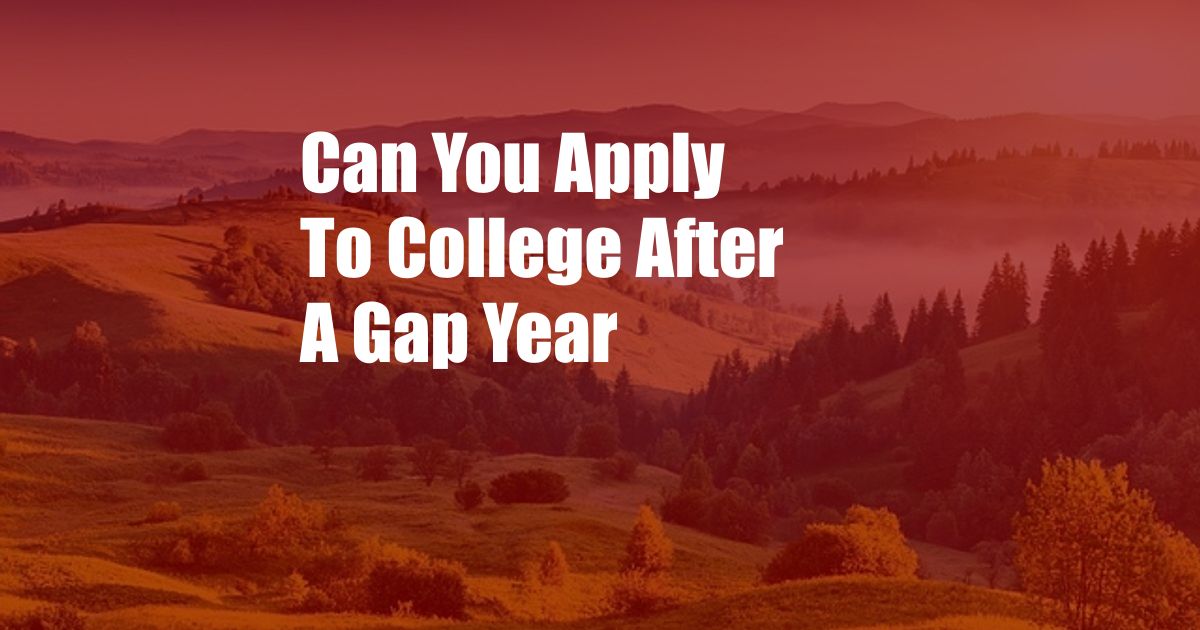
Deciding Between a Gap Year and College: Exploring Options and Making Informed Choices
The transition from high school to college is a momentous step, often filled with excitement and apprehension. While many students embark on this journey immediately after graduating, others choose to take a gap year to explore their passions, gain work experience, or travel the world. This decision can be a transformative one, offering opportunities for personal growth and self-discovery.
In this article, we will delve into the pros and cons of taking a gap year, providing insights and expert advice to help you make an informed decision that aligns with your aspirations and goals. We will explore the latest trends and developments in higher education, offering valuable perspectives on how a gap year can impact your future trajectory.
The Allure of a Gap Year: Personal Growth and Exploration
Taking a gap year allows you to step outside the traditional academic path and pursue your interests. It provides an opportunity to:
- Travel: Experience diverse cultures, broaden your horizons, and gain a deeper understanding of the world.
- Volunteer: Engage in meaningful work, give back to your community, and develop a sense of purpose.
- Work: Gain practical experience, learn new skills, and build your resume.
Weighing the Pros and Cons of a Gap Year
While a gap year can be incredibly rewarding, it’s essential to weigh the potential benefits against the challenges. Here are some points to consider:
- Benefits: Personal growth, self-discovery, increased maturity, and a broader perspective.
- Challenges: Financial implications, potential loss of academic momentum, and the need for careful planning and execution.
The Impact of a Gap Year on College Applications
Many colleges and universities view gap years positively, recognizing the value of experiential learning. However, it’s crucial to research individual schools’ policies and present your gap year experience in a compelling way during the application process. Some tips for maximizing the impact of your gap year on college applications:
- Choose meaningful activities: Engage in activities that align with your passions and demonstrate your commitment to personal growth.
- Plan carefully: Outline your goals, budget, and timeline to ensure a structured and enriching experience.
- Document your experiences: Keep a journal, take photos, and collect testimonials to showcase the impact of your gap year.
Navigating the Application Process After a Gap Year
When applying to college after a gap year, it’s essential to:
- Explain your reasons: Articulate your motivations for taking a gap year and how it has contributed to your personal and academic development.
- Highlight your experiences: Showcase the skills and experiences you gained during your gap year, emphasizing how they prepare you for higher education.
- Be prepared to answer questions: Anticipate questions about your gap year and be confident in explaining its value.
Expert Advice on Navigating a Gap Year
“A gap year can be a transformative experience, providing invaluable opportunities for personal growth and exploration. By carefully planning and documenting your experiences, you can maximize the impact of your gap year on your college applications and future career.” — Dr. Emily Carter, College Admissions Counselor
“Taking a gap year allowed me to step outside my comfort zone, gain valuable work experience, and develop a deeper understanding of my career goals. It was the best decision I made for my personal and academic journey.” — Sarah Jones, Recent College Graduate
Frequently Asked Questions About Gap Years
Q: Can I take a gap year without losing my spot at college?
A: Many colleges allow students to defer admission for a year. It’s important to contact your preferred schools to inquire about their policies.
Q: What are some affordable ways to travel during a gap year?
A: Consider budget-friendly destinations, stay in hostels, and explore discounts and travel rewards programs.
Q: How can I make the most of my gap year experience?
A: Set clear goals, immerse yourself in different cultures, and engage in activities that challenge you both personally and professionally.
Conclusion
Ultimately, the decision of whether or not to take a gap year is a personal one. By carefully weighing the pros and cons, planning effectively, and seeking expert guidance, you can maximize the benefits of a gap year while ensuring a successful transition to college. Whether you choose to embark on a transformative journey of self-discovery or dive directly into higher education, the opportunities for personal and academic growth are boundless.
Are you curious about exploring gap year options? Join our community and connect with others who have taken the leap to share their experiences and insights.